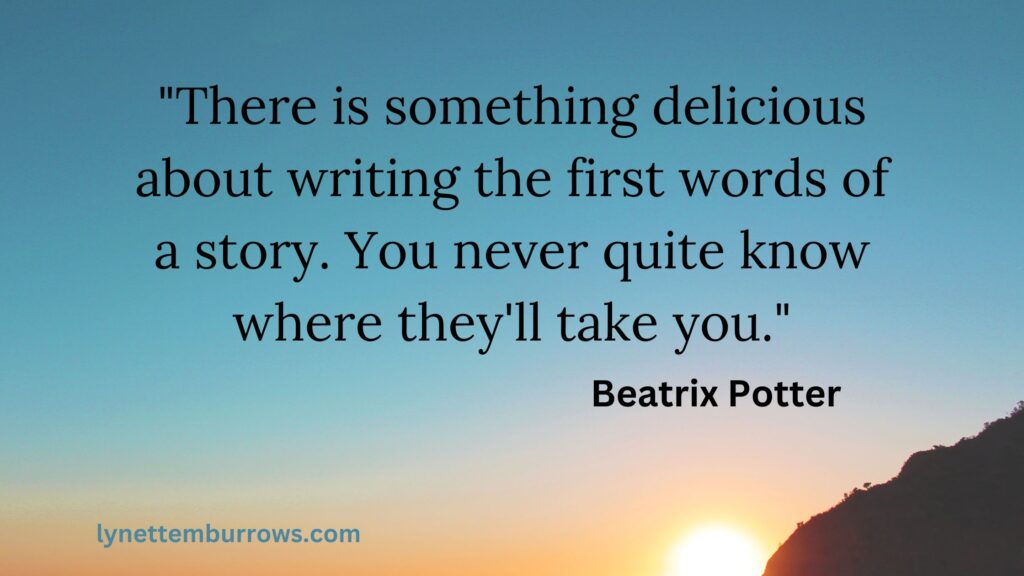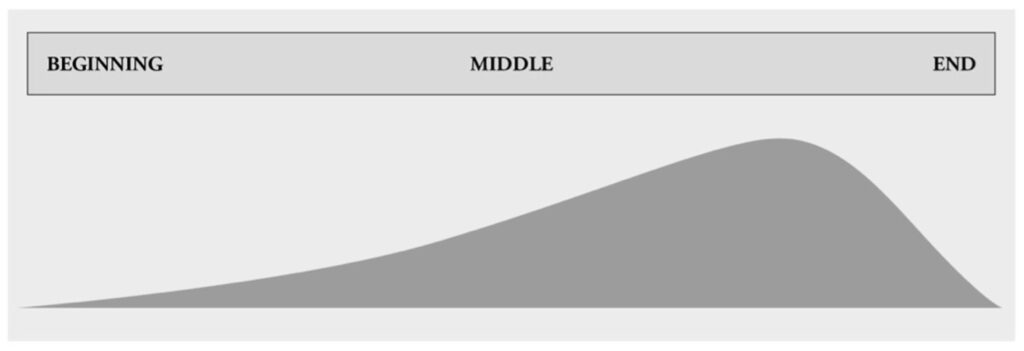
You sit down to write but no words come. Or you grind out a few dozen or hundreds of words, then delete them all because the structure wasn’t there or the characters weren’t right or the sentences were crap. You bemoan the fact that writing is hard and you think maybe this writing gig isn’t for you. If this describes you, don’t despair. You aren’t the first writer who has struggled with getting words on the page. And you won’t be the last one. Nor will this week, month, or year be the last time you experience this struggle.
Why does it have to be so hard? There’s a lot to learn about developing story ideas, about writing effective sentences, about the craft of story, about what works best for you, and many more big and small pieces of the process. You could be in a state of word-paralysis because you fear you don’t know enough. Or you agonize over not having enough talent, or about snaring this or that agent or publisher. Maybe as you write, your internal editor is telling you that what you’ve written will get you a scathing review on Amazon. Take a deep breath.
Writing is hard but it shouldn’t always be hard. Yeah, a crappy first (second, third, whatever) draft can be torment, but allow the bliss to happen, too.
The Torment
Your first dream of what a writer's life is may have been a tad over-romantic. Visions of a beautiful attic office, of bestseller lists, and throngs of fans waiting for your autograph evaporate when reality sets in. If you get caught in the torment of a crappy first draft, that dream morphs into something unreachable or a nasty nightmare. Identify what torments you and you can overcome it. While overcoming your torment may not lead to that over-romantic dream, you can experience the bliss of being a writer more often than the torment.
Indecision
Sometimes the thing that holds you back is indecision about what you want to write. You kind of know what you want to write, but you can't decide what your main character's name is or you can't decide if you want to write a romcom or a psychological thriller. Being undecided can feel safer than choosing. If you're stuck deciding what to write, then you won't be stuck writing the first page.
The Blank Page
You want to write something brilliant, a story for the ages, or a story that's deeply meaningful to you. Yet, getting those first words in black and white can make your fingers freeze and your mind blank.
Whatever form it may take for you, sometimes starting is looking up the craggy, dangerous climb up the tallest mountain.
Self-doubt
Self-doubt is a constant worry that you're not good enough or capable enough. You can't help but question whether the words you've written tell the story you see in your head. And if you compare yourself to an established and admired author, your self-doubt grows exponentially.
These doubts chip away at our self-confidence and our progress. It gets harder and harder to put words on the page. Or to move on from a chapter or scene where something "isn't right." Some people call this "imposter syndrome" or "writer's block." It can progress into a crippling certainty that every word you write is crap.
Time is Your Enemy
This is the fear that you're taking too long to write your story. Focusing on how long you take to accomplish something, you have given yourself two choices: you take too long or not long enough. Time is a precious commodity for us all, but making time your enemy only increases the pressure. Increased pressure may help you, too much pressure and it will slow or stop your progress.
Perfectionism
Closely related to self-doubt is perfectionism. You want to produce a masterful story, but the pressure of the desire or need to be perfect keeps you from moving your story forward. You polish and revise and then polish again. But you still see all the imperfections, so you go back and revise again. Progress is slow at best and sometimes, progress is nonexistent.
Oh, how I wanted to write the perfect version of my first story. That perfectionism meant I spent hours laboring over my words. Erasing, replacing, and starting over again and again was my M. O. For years.
Sometimes sneaky, sometimes blatant, the desire or need to be perfect shows up as high personal standards, strong self-criticism, and sensitivity to negative comments or reviews.
Overcome the Torment
It can be a struggle to overcome the thoughts that torment you, but it can be done. You can find advice on how to do this all over the internet. But if that advice is wrong for you, your torment gets more tortured and more painful. What to do? Look at the advice here and elsewhere online. Like shopping for clothes or preparing for a marathon, it takes a lot of trying on. What fits today might not fit tomorrow, but keep it in your files for later because it might be just right for another time or project.
Why work so hard? To experience the bliss more than once in a lifetime, to live in the bliss, you must move through and overcome the torment.
Play Mind Games
You expect things like learning to walk, learning to drive, and learning to be a brain surgeon to take time and repetition. The problem is that you hear stories from early in your life. You learn to read and write at a young age, so that should make storytelling easy, right? Not quite. You learn and relearn with each story you write. So practice some self-compassion.
Turn your negative thinking into positive thoughts. Stop thinking of the first, or any, draft as "bad." There are no bad drafts. Reframe your thoughts. Instead of this is the crappy draft say, you've made progress (however you measure that.) Or I have a diamond in the rough that I can shape into the story I want to tell.
Reframing negative thoughts into positives takes time and lots of repetition. Decide on one negative thought you want to change and practice it for a month or two. Then move on to the next one.
Beat Indecision and the Blank Page
“The scariest moment is always just before you start.”
Stephen King
It's easy to say, just decide. But sometimes you have to trick your internal editor (your mind). If you can't decide on an idea. Tell yourself you're going to take some notes. Journal about what you like about each idea and what you don't. Dictate the story. Draw a scene in the story. How does that work? Your internal editor has fewer expectations of when you take notes, journal, dictate, or draw. That gives you the freedom to express yourself.
Do what you need to to start. When I started writing, I used an electric typewriter. The sound of the machine's hum screamed at me, "write the next word." Sometimes I'd have to turn off the machine and use pen and paper in order to start.
Find the method that allows you to give up expectations of perfection or of how the story is supposed to go. Allow yourself to be imperfect and messy and chaotic. At some point, your inner storyteller will take over. When it does, let the words dance across the page.
Get Over the Idea of Scarcity
There are people who insist that the book industry is doomed. That the print book is dead or that no one reads anymore. So why write? Historically, readers haven't been a high percentage of the people on the planet. Yet, books written a hundred years ago are still being read. Thousands of books are purchased each year. No, the book industry isn't dead or dying. It is continuing to evolve. Read reputable marketing reports to keep up.
Another rumor that needs to be quelled is that there are too many writers out there. That some writers must "move along" and get out of the way of newer writers. They aren't in your way because they aren't your competition. There may be overlap between your audience and theirs, but your books are unique to you. And your readers know that.
Give Up the Idea of Limited Time
None of us know exactly how much time we have. Each of us has responsibilities, needs, and wants that pull us away from our writing. But all of us have the same 24-hour days. Use your time as wisely as you can. Lean into what works for you. Some writers get up before the distractions of the day and write during the wee morning hours. Others write in their cars, while on the subway, or during a child's sporting event.
Consider that impatience colors your view of time. You want to finish that book. Be your best friend and cheerleader. You will finish that book. You will learn what your best process is. You will not give up.
Conquer Self-Doubt
"There is a big difference between ‘falling' and ‘failing.’”
Jenny Hansen quoting Simon Sinek
Okay, that title might be optimistic. We all suffer some doubts. Crippling self-doubt is the bully at school. It keeps you from doing what you want to and can do. Play a trick on your brain if you have to. How? List your self-doubts. Then, take each thing on that list and turn it around. Change "I'm not creative enough" to "I am awakening my creativity." Change "I can't finish a story" to "I will get closer to finishing that story today." Repeat those positive statements every day before you begin your writing session. Then practice doing what you said. Even if you only do this for five minutes a day, you will become more confident. (If you need more about affirmations, see Julie Glover’s recent post.)
Give up the Idea of Perfect
Yes, some authors and "experts" say don't re-write your story. That is assuming you have internalized how to tell a story well. Some of those authors, revises as they go. Others have internalized storytelling so completely they can write a successful story in very few drafts.
"Mistakes, inconsistencies, and ugly sentences in first drafts are not fatal. They're not even serious problems. They're barely non-serious problems."
Laura VanArendonk Baugh
No one writes a perfect first draft, not the folks who say don't re-write, and not even the authors of books that are classics or books that top the charts. Remember the books you've read books with flaws. Those are the flaws that bother you, so you notice them. The books you love appear to have no flaws, because the story resonates with you.
Successful authors write the best story they can at the time. At a different time, they could not write the same story because their experiences, interests, and skills are different. Allow yourself the grace to write stories that are the best you can do now.
Find The Bliss

A novel, even a short story, can be a long slog in terms of the hours spent creating and the number of words written. Yet, the act of creation is magical. You march letters into sentences and marshaled the sentences into a story. It transports you out of this world to a realm that didn't exist until you put words on paper.
There's a special thrill a writer experiences when she sees the story coming together. Another writer may feel the thrill when he sees the number of words written become a higher than yesterday's number or the number of words yet-to-write. Maybe you re-read something you wrote years ago and think that's better than you remember it being. Those glimmers of brilliance, of writing that resonates down to your toes, are moments to cherish. Moments to remember.
The writing process can be a torturous journey where you revisit torment and bliss many times. It can test your resilience and your self-confidence. Embrace the chaos, embrace the journey, and above all, celebrate and embrace the bliss. It's magical.
Please share a tip for overcoming the torment or share a moment of bliss you've experienced in your writing journey.
About Lynette

Lynette M. Burrows is an author, blogger, creativity advocate, and Yorkie wrangler. She survived moving seventeen times between kindergarten and her high school graduation. This alone makes her uniquely qualified to write an adventure or two.
Her Fellowship series is a takes “chillingly realistic” alternate history in 1961 Fellowship America where autogyros fly and following the rules isn’t optional. Books one and two, My Soul to Keep, and If I Should Die, are available everywhere books are sold online. Book three, And When I Wake, is scheduled to be published in late 2024.
Lynette lives in the land of OZ. She is a certifiable chocoholic and coffee lover. When she’s not blogging or writing or researching her next book, she avoids housework and plays with her two Yorkshire terriers. You can find Lynette online on Facebook or on her website.











